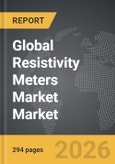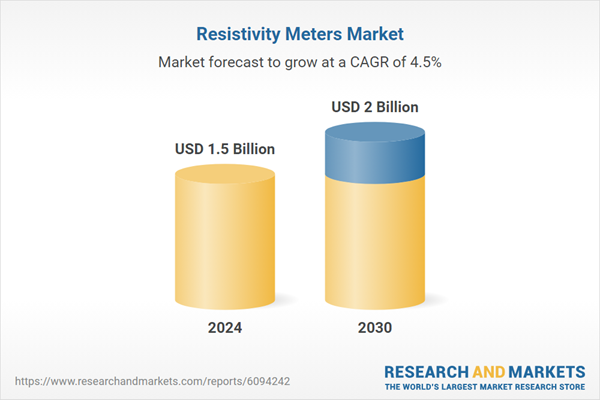Global Resistivity Meters Market - Key Trends & Drivers Summarized
Why Is There Renewed Industry Interest in a Conventional Tool Like Resistivity Meters?
Resistivity meters, long regarded as essential instruments for geophysical surveys and subsurface characterization, are gaining renewed traction across a wide range of industries. Their ability to accurately measure electrical resistance in soil and rock formations makes them vital for applications such as groundwater exploration, environmental site assessments, and mineral prospecting. As climate change drives urgency around sustainable water management, resistivity meters are increasingly used to map aquifers, monitor contamination, and assess soil salinity levels. The rise of smart agriculture and precision farming has also contributed to their adoption, as farmers seek to understand soil composition and optimize irrigation practices. Moreover, infrastructure projects involving tunnels, dams, and foundations require detailed subsurface data, further reinforcing the utility of resistivity meters. Energy companies are turning to these devices for evaluating geothermal energy potential, while archaeologists and forensic investigators leverage their non-invasive nature for site studies. The integration of GPS and real-time data transmission has modernized resistivity meter systems, enabling remote monitoring and improved accuracy. In emerging economies, government-led initiatives for natural resource mapping are creating significant market opportunities. Additionally, industries exploring carbon capture and storage (CCS) rely on resistivity measurements to track underground CO2 movement. This convergence of environmental, industrial, and technological demand is repositioning resistivity meters as indispensable tools for the future.How Are Technology Enhancements Transforming Resistivity Meter Capabilities?
Technological evolution is transforming resistivity meters into more sophisticated and efficient field instruments. The integration of multi-channel data logging has significantly increased the speed and resolution of subsurface imaging, allowing for deeper and more granular surveys. Modern resistivity meters now feature ruggedized touchscreens, advanced visualization software, and modular electrode systems that enable flexible configurations. Lightweight and portable designs have improved their usability in remote and hard-to-reach terrains. Wireless data transmission and cloud integration allow technicians to remotely access readings and share results in real time, dramatically reducing processing delays. Enhanced digital signal processing (DSP) capabilities have improved noise filtering and made data more reliable even in harsh field conditions. Battery life has also seen major improvements, with lithium-ion systems supporting extended field operations. Dual-mode instruments that combine resistivity and induced polarization (IP) capabilities are growing in popularity for their ability to detect both conductive and chargeable materials. User-friendly interfaces and automated calibration systems are expanding accessibility for less experienced field workers. Manufacturers are also investing in eco-friendly materials and more durable housing to extend instrument life and reduce environmental impact. These innovations are redefining resistivity meters as smart, connected, and field-resilient instruments, broadening their appeal across both traditional and emerging applications.Where Is Demand Growing the Fastest - And Which Sectors Are Leading the Way?
Demand for resistivity meters is growing fastest in sectors where precision geophysical data is essential for safety, sustainability, and productivity. The construction and infrastructure industry has emerged as a key driver, as urbanization fuels the need for accurate subsurface assessments for high-rise buildings, bridges, tunnels, and dams. Water utilities and hydrology departments are investing in resistivity equipment to monitor groundwater movement and ensure long-term water resource sustainability. Mining and mineral exploration continue to be strongholds for resistivity meter usage, particularly in Africa, South America, and Australia, where mineral-rich terrains necessitate detailed geophysical profiling. Agriculture is another growth sector, with smart farming technologies integrating soil resistivity data to optimize yields and reduce water wastage. Government agencies involved in geological mapping, disaster management, and environmental remediation are expanding their use of resistivity surveys to assess contamination, detect sinkholes, and monitor land degradation. The oil and gas sector is employing resistivity meters in exploration and environmental compliance applications, while academic and research institutions are purchasing advanced units for field training and experimental geology. Humanitarian and NGO-driven projects around water access in arid regions are also creating new use cases for portable resistivity meters. The diversity of end-use sectors is helping drive consistent market expansion globally.What Factors Are Fueling Growth in the Global Resistivity Meters Market?
The growth in the global resistivity meters market is driven by several factors rooted in technological advancement, application diversity, and global sustainability needs. The accelerating pace of infrastructure and urban development has created strong demand for reliable subsurface analysis tools. Growing water scarcity and heightened focus on groundwater conservation are pushing governments and utilities to adopt resistivity surveys for hydrological modeling. The increasing frequency of natural disasters and climate-induced land changes is driving investments in environmental monitoring technologies, including resistivity meters. Rising mineral and rare earth element demand is encouraging exploration activities, especially in developing economies, fueling equipment procurement. The expansion of precision agriculture is generating interest in soil profiling tools, particularly in large farming operations in North America, Europe, and Asia. Academic research funding for geophysical education and scientific exploration is supporting sustained purchase cycles among universities and institutions. Meanwhile, global efforts to track CO2 sequestration for climate mitigation are opening a new frontier for resistivity applications in carbon capture. Additionally, affordability and durability enhancements have lowered the barrier to entry for smaller firms and NGOs, enabling wider market penetration. The combination of these drivers is building a strong and resilient growth trajectory for resistivity meters worldwide.Report Scope
The report analyzes the Resistivity Meters market, presented in terms of market value (US$). The analysis covers the key segments and geographic regions outlined below:- Segments: Type (Surface Resistivity Meter, Volume Resistivity Meter, Other Types); Application (Mining, Environment, Lab Measurements, Examination Of Building Materials, Water Exploration, Other Applications).
- Geographic Regions/Countries: World; United States; Canada; Japan; China; Europe (France; Germany; Italy; United Kingdom; Spain; Russia; and Rest of Europe); Asia-Pacific (Australia; India; South Korea; and Rest of Asia-Pacific); Latin America (Argentina; Brazil; Mexico; and Rest of Latin America); Middle East (Iran; Israel; Saudi Arabia; United Arab Emirates; and Rest of Middle East); and Africa.
Key Insights:
- Market Growth: Understand the significant growth trajectory of the Surface Resistivity Meter segment, which is expected to reach US$1.2 Billion by 2030 with a CAGR of a 4.3%. The Volume Resistivity Meter segment is also set to grow at 5.3% CAGR over the analysis period.
- Regional Analysis: Gain insights into the U.S. market, valued at $414.6 Million in 2024, and China, forecasted to grow at an impressive 8.2% CAGR to reach $410.5 Million by 2030. Discover growth trends in other key regions, including Japan, Canada, Germany, and the Asia-Pacific.
Why You Should Buy This Report:
- Detailed Market Analysis: Access a thorough analysis of the Global Resistivity Meters Market, covering all major geographic regions and market segments.
- Competitive Insights: Get an overview of the competitive landscape, including the market presence of major players across different geographies.
- Future Trends and Drivers: Understand the key trends and drivers shaping the future of the Global Resistivity Meters Market.
- Actionable Insights: Benefit from actionable insights that can help you identify new revenue opportunities and make strategic business decisions.
Key Questions Answered:
- How is the Global Resistivity Meters Market expected to evolve by 2030?
- What are the main drivers and restraints affecting the market?
- Which market segments will grow the most over the forecast period?
- How will market shares for different regions and segments change by 2030?
- Who are the leading players in the market, and what are their prospects?
Report Features:
- Comprehensive Market Data: Independent analysis of annual sales and market forecasts in US$ Million from 2024 to 2030.
- In-Depth Regional Analysis: Detailed insights into key markets, including the U.S., China, Japan, Canada, Europe, Asia-Pacific, Latin America, Middle East, and Africa.
- Company Profiles: Coverage of players such as 3M, A D Metro, AMT Co., Ltd., DMC Co., Ltd., EETI (Egalax_eMPIA Technology) and more.
- Complimentary Updates: Receive free report updates for one year to keep you informed of the latest market developments.
Some of the 48 companies featured in this Resistivity Meters market report include:
- ACL Staticide
- AEMC Instruments
- AGI (Advanced Geosciences Inc.)
- Botron Company Inc.
- Chongqing Gold M&E Equipment
- Desco Industries Inc.
- Extech Instruments
- Fann Instrument Company
- Fluke Corporation
- Giatec Scientific Inc.
- Hioki E.E. Corporation
- Humboldt Mfg. Co.
- IRIS Instruments
- Kusam-Meco Instruments
- M.C. Miller Co., Inc.
- Megger Group Limited
- OFI Testing Equipment, Inc.
- Phoenix Geophysics Ltd.
- Sonel S.A.
- Zonge International Inc.
This edition integrates the latest global trade and economic shifts into comprehensive market analysis. Key updates include:
- Tariff and Trade Impact: Insights into global tariff negotiations across 180+ countries, with analysis of supply chain turbulence, sourcing disruptions, and geographic realignment. Special focus on 2025 as a pivotal year for trade tensions, including updated perspectives on the Trump-era tariffs.
- Adjusted Forecasts and Analytics: Revised global and regional market forecasts through 2030, incorporating tariff effects, economic uncertainty, and structural changes in globalization. Includes historical analysis from 2015 to 2023.
- Strategic Market Dynamics: Evaluation of revised market prospects, regional outlooks, and key economic indicators such as population and urbanization trends.
- Innovation & Technology Trends: Latest developments in product and process innovation, emerging technologies, and key industry drivers shaping the competitive landscape.
- Competitive Intelligence: Updated global market share estimates for 2025, competitive positioning of major players (Strong/Active/Niche/Trivial), and refined focus on leading global brands and core players.
- Expert Insight & Commentary: Strategic analysis from economists, trade experts, and domain specialists to contextualize market shifts and identify emerging opportunities.
Table of Contents
Companies Mentioned (Partial List)
A selection of companies mentioned in this report includes, but is not limited to:
- ACL Staticide
- AEMC Instruments
- AGI (Advanced Geosciences Inc.)
- Botron Company Inc.
- Chongqing Gold M&E Equipment
- Desco Industries Inc.
- Extech Instruments
- Fann Instrument Company
- Fluke Corporation
- Giatec Scientific Inc.
- Hioki E.E. Corporation
- Humboldt Mfg. Co.
- IRIS Instruments
- Kusam-Meco Instruments
- M.C. Miller Co., Inc.
- Megger Group Limited
- OFI Testing Equipment, Inc.
- Phoenix Geophysics Ltd.
- Sonel S.A.
- Zonge International Inc.
Table Information
| Report Attribute | Details |
|---|---|
| No. of Pages | 294 |
| Published | February 2026 |
| Forecast Period | 2024 - 2030 |
| Estimated Market Value ( USD | $ 1.5 Billion |
| Forecasted Market Value ( USD | $ 2 Billion |
| Compound Annual Growth Rate | 4.5% |
| Regions Covered | Global |








